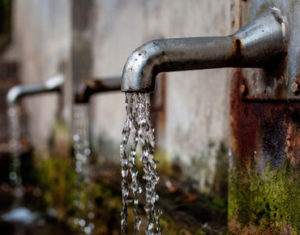Clean Drinking Water
Improved Access to Safe Water, Sanitation and proper Hygiene Promotion Programs to the Conflict affected rural Communities in South Sudan

A rusty tap pouring clean drinking water, even a rusty tap like this remains a dream for the residents of Ayod...
One key life-saving program is WASH (water is life). As a Water, Hygiene and Sanitation partner in South Sudan, PASS maintains direct and sustained engagement with communities through a transparent and continuous two-way communication that captures records and relays the expressed risks, needs, capacities and aspirations of communities.
PASS intervention actions and approaches are to enable communities to participate meaningfully in key decisions throughout the program cycle: assessment and analysis, planning and design, resource mobilization, implementation, monitoring and evaluation.
The risk of exposure of displaced women and girls to sexual violence, caused by living in highly insecure settlements are mitigated by the PASS project team working closely with protection committees when issues of GBV or child abuse are encountered.
Prior to commencement of Hygiene interventions, community participation in the planning and implementation of the program are always sought as it is paramount and complaint /feedback mechanisms agreed upon and established. Monitoring of the complaints and remedial action are documented during the project implementation cycle. This will be with a view of promoting accountability to the affected population.
A broad spectrum of community members (women, men, persons with disabilities) have been and are always consulted and aided to participate in decision-making through an inclusive, nondiscriminatory and influential way. This was done through communication approaches that include clear and direct feedback loops between project staff involved in program design, management and the communities themselves.
Community members were consulted through focused group discussions (FGDs), to get their preliminary contribution to overall project design, implementation and monitoring and appropriateness of WASH facilities and interventions.
Community participation in project monitoring and evaluation is done including utilization of single sex focus groups, same age peer group discussions to obtain accurate feedback from beneficiaries as an accountability mechanisms aimed at implementing lessons learnt and avoid recurrence of implementation short falls in coming/ongoing projects quality services delivery.
Distribution of None-food items (NFIs), Construction of Latrines, Rehabilitation of latrines, Hygiene promotion awareness through posters, banners, Radio talk shows, Establishment of School Health Clubs, Drilling of Boreholes and Borehole Rehabilitations. However, in all its WASH programs PASS will apply its conflict sensitivity approach to safeguard that beneficiaries, staff and partner selection does not raise or reinforce existing tensions and will conduct a conflict analysis to avoid negative impacts and increase positive outcomes.
Specific Objective
Our specific objectives are to reducing Morbidity, Mortality, and Suffering from protection threats, WASH-related diseases and incidences of occurrence of severe global acute malnutrition, Cholera and AWD among children under 5 and floods and conflict affected persons in South Sudan.


